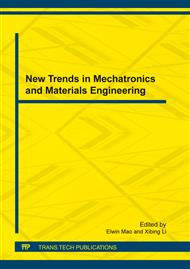p.155
p.160
p.165
p.170
p.175
p.179
p.184
p.189
p.193
The Optimal Scheduling for PCB Flexible Assembling Automation
Abstract:
For improve the efficiency of the automation, the optimal scheduling problem in a PCB flexible assembling automation is studied. Automation within the system has flexibilities, so some assembly operations can be handled by different automation and assembling time can different. Based on this sort of assembling automation, the minimum balance algorithm is presented in this paper, and an example demonstrates its effectiveness.
Info:
Periodical:
Pages:
175-178
DOI:
Citation:
Online since:
January 2012
Authors:
Keywords:
Price:
Сopyright:
© 2012 Trans Tech Publications Ltd. All Rights Reserved
Share:
Citation:


